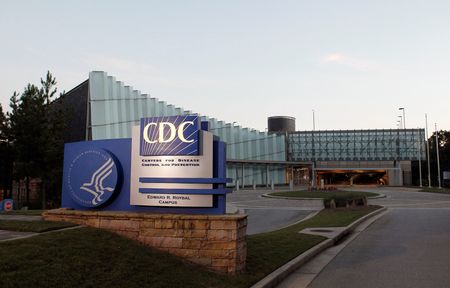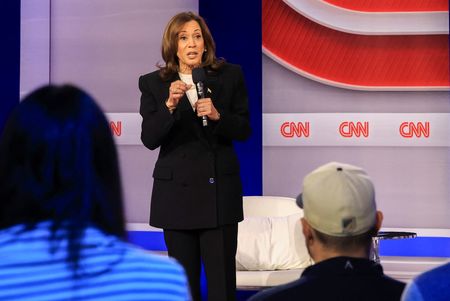By Stephanie Kelly
ASHEVILLE, North Carolina (Reuters) – Republican Party leaders met in hurricane-torn North Carolina last week with a mission: figure out how to reach displaced or cut-off potential Donald Trump voters. They thought of flying in absentee ballot registrations via helicopter or having mules or all-terrain vehicles take voters to the polls.
With the presidential race as tight as ever, Democrats for Kamala Harris are taking a different approach, ruling out some areas as too storm-torn and some voters as unlikely prospects as the two parties fight over the battleground state, one of a handful that will decide the Nov. 5 election.
Reuters traveled hundreds of miles across western North Carolina counties over four days, speaking to some three dozen party officials, voters, candidates and activists to discuss how best to motivate voters in the wake of Hurricane Helene, which killed at least 96 people in the state.
“You think we’re joking about these mules,” said state Republican chairman Jason Simmons. “You will have various traditional and non-traditional means of voter contact.”
Early turnout in North Carolina suggests voters understand the leading role their state plays in the election. Last week, North Carolina set a first-day early voting record of 353,166 ballots cast, topping its previous record in 2020 by 1.3%.
Data published on Wednesday showed 34.5% of ballots cast were Democratic, while 33.9% were Republican, versus 43.7% Democratic and 27.5% Republican during the same time in 2020.
Former President Trump and Vice President Harris are nearly tied in the state, according to opinion poll aggregator FiveThirtyEight, with Trump at 48.1% support and Harris at 47.3% support.
A TOSS-UP?
Republicans say they believe Hurricane Helene has rallied support for the party.
“They (people) see what has been, at best, a lackluster response by the federal government, and it’s only amplified their frustrations with what they see in Washington, D.C.,” the Republican Simmons said.
“The motivation hasn’t changed. It’s only been amplified.”
Simmons said the first priority when contacting voters in affected counties is to make sure they are safe. And the second: making sure they have a plan to vote.
While some state officials – including some Republicans – praise federal cleanup efforts, strong criticism, reinforced by false rumors, has been aimed at the Democratic administration of President Joe Biden and Harris, his vice president, over how much aid arrived and how fast it came.
As of Sunday, the Biden administration had approved more than $300 million in assistance across North Carolina, including $118 million in individual assistance to more than 87,600 households, and more than $189 million for debris removal and other emergency efforts. More than 1,500 federal personnel remain deployed to support the recovery.
Across all hurricane-affected areas in the Southeast and Appalachia, the Biden administration has approved nearly $2 billion for hurricane recovery assistance.
Some Democratic leaders are worried about the spread of misinformation, some of it by Trump, along with the post-storm flight of voters in Buncombe County, a Democratic stronghold in the 2020 election.
Trump has repeatedly and falsely accused Biden and Harris of using federal emergency funds on housing migrants in the country illegally. Despite White House denials, the rumors have spread quickly by word of mouth and online.
The Republican Party “does not have to endorse the disinformation to benefit from it,” said Asher Hildebrand, a professor at Duke University’s Sanford School of Public Policy.
“I think our numbers may not be what they need to be,” said Kathie Kline, Democratic chair in Buncombe County, which includes the city of Asheville.
“Buncombe County could very much – and this disaster could very much – have a lot to do with losing the election for Harris,” Kline said.
DEMOCRATS’ FRAGILE HOPES
Nationwide the Harris campaign has been focusing on winning over Republicans, but the misinformation has prompted a change of Democratic tactics in Buncombe County.
“We were targeting a lot of or some Republicans that we thought were possibly persuadable,” Kline said. Now she is reluctant to send anyone to knock on Republican voters’ doors, because “we just don’t know about how volatile they might be.”
Democrats have been optimistic before about their chances of carrying North Carolina, only to have their hopes dashed. Former President Barack Obama in 2008 was the last Democrat to win the state, albeit by a mere 49.7% to 49.4%.
At one point Kline drove around a precinct to identify which areas they should not canvass because the damage was too significant, and displayed a color-coded map to volunteers.
“If we don’t canvass and Harris loses, it could be our fault,” Kline said. “If we do canvass and we upset everyone that we’re knocking on their doors, then we’ll lose anyway.”
North Carolina State Representative Lindsey Prather, a Democrat seeking reelection in a district near Asheville, only recently resumed sending election information to supporters instead of hurricane-related texts.
Buncombe County Democrats have reduced their phone banking efforts and increased radio ads. Buncombe County Republicans have a team of 11 people pushing out at least 220 calls a day.
Indivisible Asheville/WNC, a progressive voter outreach group, is handing out election information at hurricane distribution centers and relying on local community members to find neighbors who need help getting to the polls.
Though first-day voting set a record, overall turnout remains a question mark. “This (the hurricane) has changed everything,” Prather said.
(Reporting by Stephanie Kelly in North Carolina; Editing by Heather Timmons and Howard Goller)











